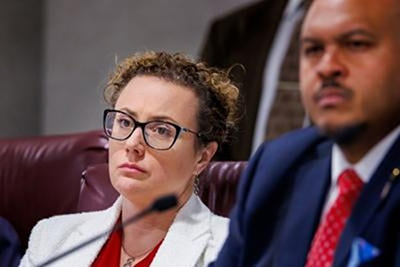By Ryan Dailey
The News Service of Florida.
TALLAHASSEE — A measure that seeks to prevent colleges and universities from spending money on diversity, equity and inclusion initiatives is ready to go before the full Senate amid strong objections from Democrats, with one Black senator calling the proposal “racist at its core.”
The bill (SB 266) also has reignited a debate about academic freedom on campuses, in part because it could lead to changes related to general core courses.
The Republican-controlled Senate Fiscal Policy Committee approved the proposal Thursday after an hours-long and at-times tense debate. A similar House bill (HB 999) also is primed to go before the full House.
Part of the Senate bill that has generated controversy would prevent schools from spending state or federal money “to promote, support, or maintain any programs or campus activities” that advocate for “diversity, equity, and inclusion, or promote or engage in political or social activism,” as defined by the State Board of Education or state the university system’s Board of Governors.
Senate bill sponsor Erin Grall, R-Vero Beach, argued that diversity, equity and inclusion, or DEI, initiatives, are discriminatory.
“We want diverse viewpoints. We want fair treatment and full participation of all people, and an environment that examines ideas freely. The ideas of, maybe, why there have been inequalities in the past. But modern DEI initiatives, under the guise of social justice or critical theory, seek to increase representation of some groups through discrimination against members of other groups,” Grall said.
The push to eliminate DEI programs in higher education has been a priority of Gov. Ron DeSantis during the legislative session. DeSantis’ administration this year also directed colleges and universities to provide lists of DEI initiatives on each campus and costs associated with them.
The bill approved Thursday would carry out a DeSantis proposal to end such spending. DeSantis said the programs would “wither on the vine.”
But faculty members and other people on college and university campuses have fought the bill.
“We’re really concerned about this being a backlash about, really, a democratic, diverse society,” Candi Churchill, executive director of the United Faculty of Florida union, said during Thursday’s meeting.
Democrats also criticized part of the bill that deals with general core courses. The State Board of Education, which oversees state colleges, and the universities’ Board of Governors would be required to appoint faculty committees that would review core course options. Those reviews could lead to the “removal, alignment, realignment, or addition” of courses based on various criteria.
One requirement would be that core courses could not teach “identity politics,” or be “based on theories that systemic racism, sexism, oppression, and privilege are inherent in the institutions of the United States and were created to maintain social, political, and economic inequities.”
Grall faced questions from Democrats about the proposed prohibition on instruction about systemic racism.
Sen. Geraldine Thompson, D-Windermere, said the University of Florida, for example, “for 100 years had no African American students.”
“Would you believe that it was happenstance that there were no African American students? Or could that be attributed to systemic racism?” Thompson asked.
“I don’t believe that the things in our history are necessarily happenstance,” Grall replied. “This bill does not seek to erase a history of racism that has existed during certain parts of our history, or any other persecution of any group across the globe … What it does is, it says that we are not going to present one point of view with regard to all of the institutions of the United States.”
Sen. Shevrin Jones, D-Miami Gardens, became emotional as he argued against the bill.
“I don’t care what you can say that this policy does and does not do, the crux of this policy and a lot of the policies that we’re passing is racist at its core,” Jones said.
The wide-ranging measure also seeks to make changes such as giving university presidents ultimate authority over hiring decisions at their schools.
As the legislation has moved through the process, it also has spurred objections from academics outside of Florida.
Irene Mulvey, president of the Washington, D.C.-based American Association of University Professors, spoke against the bill during the meeting. Mulvey said higher education is organized around a “framework based on academic freedom and shared governance” — and characterized the bill as a threat to its foundation.
“By dismantling this framework that underlies American higher-ed, and so brazenly undermining the role of faculty, SB 266 will lead to diminished educational quality. And this will show up before you know it in measurable ways. In faculty leaving, in rankings, in accreditation, in applications, in enrollment and donations,” said Mulvey, who is a professor of mathematics at Fairfield University in Connecticut.

